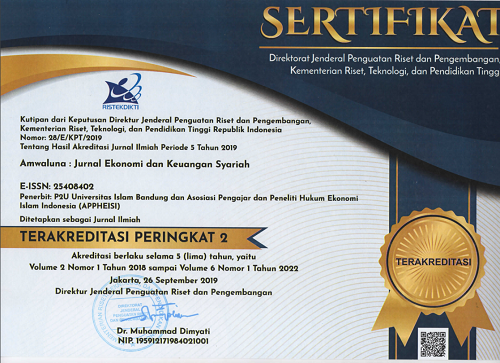Exploration Of Social Exchange Theory: Costumer Loyalty with Trust And Satisfaction As Intervening in Islamic People's Financing Banks (BPRS)
Abstract
This research was at the Medan City Islamic People's Credit Bank (BPRS), which was lagging in terms of the number of customers and information technology. This study aims to determine the effect of organizational information and information technology on loyalty by using the intervening variables of satisfaction and trust. This research used correlational quantitative and Structural Equation Models (SEM). Respondents used in this study were 314 BPRS customers who are still active. The results showed that the information technology used by the BPRS did not affect loyalty where satisfaction was the intervention variable. On the other hand, organizational communication had an influence on customer loyalty with customer trust as an intervention variable
Keywords
Full Text:
PDFReferences
Abadi, R. R., Nursyamsi, I., & Syamsuddin, A. R. (2020). Effect of Customer Value and Experiential Marketing to Customer Loyalty with Customer Satisfaction as Intervening Variable (Case Study on Gojek Makassar Consumers). The Asian Journal of Technology Management, 13(1), 82–97.
Abdurokhim, A. (2016). Analisis Komparatif Penggunaan Sistem Informasi Perbankan antara Bank Syariah aan Bank Konvensional. Syntax Literate; Jurnal Ilmiah Indonesia, 1(1), 41–54.
Allassani, W. (2013). The impact of it governance on it projects-the case of the ghana rural bank computerization and inter-connectivity project. JISTEM-Journal of Information Systems and Technology Management, 10, 271–286.
Anshori, A. G. (2008). Sejarah Perkembangan Hukum Perbankan Syariah di Indonesia dan Implikasinya bagi Praktik Perbankan Nasional. La_Riba, 2(2), 159–172.
Bagozzi, R. P. (1975). Social exchange in marketing. Journal of the Academy of Marketing Science, 3(3), 314–327.
Berry, L. L. (2002). Relationship marketing of services perspectives from 1983 and 2000. Journal of Relationship Marketing, 1(1), 59–77.
Christensen, L. T. (1997). Marketing as auto-communication. Consumption, Markets and Culture, 1(3), 197–227.
Juwaini, A., Chidir, G., Novitasari, D., Iskandar, J., Hutagalung, D., Pramono, T., Maulana, A., Safitri, K., Fahlevi, M., Sulistyo, A., & others. (2022). The role of customer e-trust, customer e-service quality and customer e-satisfaction on customer e-loyalty. International Journal of Data and Network Science, 6(2), 477–486.
Juwaini, A., Chidir, G., Novitasari, D., Iskandar, J., Hutagalung, D., Pramono, T., Maulana, A., Safitri, K., Fahlevi, M., Sulistyo, A., & others. (2022). The role of customer e-trust, customer e-service quality and customer e-satisfaction on customer e-loyalty. International Journal of Data and Network Science, 6(2), 477–486.
Jin, B., Park, J. Y., & Kim, J. (2008). Cross-cultural examination of the relationships among firm reputation, e-satisfaction, e-trust, and e-loyalty. International Marketing Review.
Key, T. M., & Czaplewski, A. J. (2017). Upstream social marketing strategy: An integrated marketing communications approach. Business Horizons, 60(3), 325–333.
Kurniasari, F., Gunardi, A., Putri, F., & Firmansyah, A. (2021). The role of financial technology to increase financial inclusion in Indonesia. International Journal of Data and Network Science, 5(3), 391–400.
Laukkanen, T. (2007). Internet vs mobile banking: comparing customer value perceptions. Business Process Management Journal.
Lee, J. J., Capella, M. L., Taylor, C. R., Gabler, C. B., & others. (2014). The financial impact of loyalty programs in the hotel industry: A social exchange theory perspective. Journal of Business Research, 67(10), 2139–2146.
Leninkumar, V. (2017). The relationship between customer satisfaction and customer trust on customer loyalty. International Journal of Academic Research in Business and Social Sciences, 7(4), 450–465.
Lu, J., Yu, C.-S., Liu, C., & Yao, J. E. (2003). Technology acceptance model for wireless Internet. Internet Research.
Luo, X. (2002). Trust production and privacy concerns on the Internet: A framework based on relationship marketing and social exchange theory. Industrial Marketing Management, 31(2), 111–118.
Maharsi, S., & Fenny, F. (2006). Analisa Faktor-Faktor yang Mempengaruhi Kepercayaan dan Pengaruh Kepercayaan Terhadap Loyalitas Pengguna Internet Banking di Surabaya. Jurnal Akuntansi Dan Keuangan, 8(1), 35–51.
Mukherjee, A., & Nath, P. (2003). A model of trust in online relationship banking. International Journal of Bank Marketing
Muceldili, B., Erdil, O., & Mango, W. (2017). An investigation of self-service technology (SST) of participation banking in Turkey. Pressacademia, 4(2), 145–153. https://doi.org/10.17261/pressacademia.2017.444
Oppong, P., Adjei, H., & Poku, K. (2014). The role of information technology in building customer loyalty in banking:(a case study of agricultural development bank ltd., Sunyani). British Journal of Marketing Studies, 2(4), 9–29.
Osho, G. S. (2008). How technology is breaking traditional barriers in the banking industry: Evidence from financial management perspective. European Journal of Economics, Finance and Administrative Sciences, 11(3), 15–21.
Owen, R., & Humphrey, P. (2009). The structure of online marketing communication channels. Journal of Management and Marketing Research, 2, 1.
Parajuli, S., Paudel, U. R., & Devkota, N. (2020). Banking communications: A perceptual study of customer relations. South Asian Journal of Social Studies and Economics, 8(3), 23–34.
Rizan, M., Warokka, A., & Listyawati, D. (2014). Relationship marketing and customer loyalty: do customer satisfaction and customer trust really serve as intervening variables? Journal of Marketing Research & Case Studies, 2014, 1.
Sierra, J. J., & McQuitty, S. (2005). Service providers and customers: social exchange theory and service loyalty. Journal of Services Marketing.
Sivakumar, R., Chandramohan, M. T., & Anbazhagan, A. (2020). Repercussion of digital marketing on performance of Indian rural banks. Journal of Critical Review, 7.
Surjaatmadja, S., Tabrani, & Kusniwati, A. (2021). The Structural Relationship Information Technology Used and Risk toward Banking Customer Satisfaction during Covid19, Indonesia. Turkish Journal of Computer and Mathematics Education (TURCOMAT), 12(4), 1618–1630. https://doi.org/10.17762/turcomat.v12i4.1417
Syafei, A. W., Widuhung, S. D., & Hadi, K. (2013). Penerapan Teknologi (Sistem) Berbasis Islam Pada Bank Syariah di Indonesia. Jurnal Al-Azhar Indonesia Seri Pranata Sosial, 2(1), 1–11.
Welch, M. (2006). Rethinking relationship management: Exploring the dimension of trust. Journal of Communication Management.
Young-Ybarra, C., & Wiersema, M. (1999). Strategic flexibility in information technology alliances: The influence of transaction cost economics and social exchange theory. Organization Science, 10(4), 439–459.
DOI: https://doi.org/10.29313/amwaluna.v7i2.11613
Refbacks
- There are currently no refbacks.
Editorial Office:
Syariah Faculty, Universitas Islam Bandung
Jalan Tamansari No. 24-26 Kota Bandung

Amwaluna : Jurnal Ekonomi dan Keuangan Syariah is licensed under a Creative Commons Attribution-NonCommercial-ShareAlike 4.0 International License.







